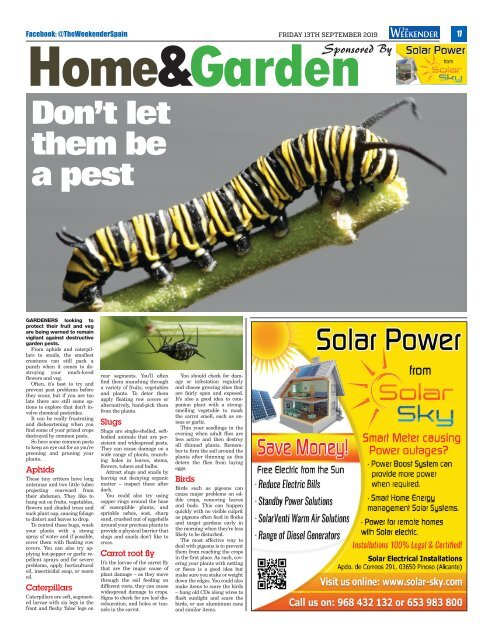You also want an ePaper? Increase the reach of your titles
YUMPU automatically turns print PDFs into web optimized ePapers that Google loves.
Facebook: @The<strong>Weekender</strong>Spain<br />
23<br />
Facebook: @The<strong>Weekender</strong>Spain<br />
FRIDAY 13TH SEPTEMBER 2019 17<br />
Home&Garden<br />
Home&Garden<br />
Sponserd By<br />
Sponsored By<br />
If you have made the decision or are<br />
thinking about making the decision to<br />
go solar, then you may be wondering -<br />
how does sunlight actually gets turned<br />
into electricity?<br />
Don’t let<br />
You may have other questions too,<br />
such as will your solar panels work on<br />
cloudy days, and will your panels work<br />
at night via moonlight, which, after all,<br />
is reflected sunlight? To find out the<br />
them be<br />
a pest<br />
answer to these questions and a few<br />
more, please read on.<br />
Charge your<br />
home with the<br />
power of the sun<br />
GARDENERS looking to<br />
protect their fruit and veg<br />
are being warned to remain<br />
vigilant against destructive<br />
garden pests.<br />
From aphids and caterpillars<br />
to snails, the smallest<br />
creatures can still pack a<br />
punch when it comes to destroying<br />
your much-loved<br />
flowers and veg.<br />
Often, it’s best to try and<br />
prevent pest problems before<br />
they occur, but if you are too<br />
late there are still some options<br />
to explore that don’t involve<br />
chemical pesticides.<br />
It can be really frustrating<br />
and disheartening when you<br />
find some of your prized crops<br />
destroyed by common pests.<br />
So here some common pests<br />
to keep an eye out for as you’re<br />
preening and pruning your<br />
plants.<br />
Aphids<br />
These tiny critters have long<br />
antennae and two little tubes<br />
projecting rearward from<br />
their abdomen. They like to<br />
hang out on fruits, vegetables,<br />
flowers and shaded trees and<br />
suck plant sap, causing foliage<br />
to distort and leaves to drop.<br />
To control these bugs, wash<br />
your plants with a strong<br />
spray of water and if possible,<br />
cover them with floating row<br />
covers. You can also try applying<br />
hot-pepper or garlic repellent<br />
sprays and for severe<br />
problems, apply horticultural<br />
oil, insecticidal soap, or neem<br />
oil.<br />
Caterpillars<br />
Caterpillars are soft, segmented<br />
larvae with six legs in the<br />
front and fleshy ‘false’ legs on<br />
rear segments. You’ll often<br />
find them munching through<br />
a variety of fruits, vegetables<br />
and plants. To deter them<br />
apply floating row covers or<br />
alternatively, hand-pick them<br />
from the plants.<br />
Slugs<br />
Slugs are single-shelled, softbodied<br />
animals that are persistent<br />
and widespread pests.<br />
They can cause damage on a<br />
wide range of plants, munching<br />
holes in leaves, stems,<br />
flowers, tubers and bulbs.<br />
Attract slugs and snails by<br />
leaving out decaying organic<br />
matter – inspect these after<br />
dark.<br />
You could also try using<br />
copper rings around the base<br />
of susceptible plants, and<br />
sprinkle ashes, soot, sharp<br />
sand, crushed nut of eggshells<br />
around your precious plants to<br />
provide a physical barrier that<br />
slugs and snails don’t like to<br />
cross.<br />
Carrot root fly<br />
It’s the larvae of the carrot fly<br />
that are the major cause of<br />
plant damage – as they move<br />
through the soil feeding on<br />
different roots, they can cause<br />
widespread damage to crops.<br />
Signs to check for are leaf discolouration,<br />
and holes or tunnels<br />
in the carrot.<br />
You should check for damage<br />
or infestation regularly<br />
and choose growing sites that<br />
are fairly open and exposed.<br />
It’s also a good idea to companion<br />
plant with a strongsmelling<br />
vegetable to mask<br />
the carrot smell, such as onions<br />
or garlic.<br />
Thin your seedlings in the<br />
evening when adult flies are<br />
less active and then destroy<br />
all thinned plants. Remember<br />
to firm the soil around the<br />
plants after thinning as this<br />
deters the flies from laying<br />
eggs.<br />
Birds<br />
Birds such as pigeons can<br />
cause major problems on edible<br />
crops, removing leaves<br />
and buds. This can happen<br />
quickly with no visible culprit<br />
as pigeons often feed in flocks<br />
and target gardens early in<br />
the morning when they’re less<br />
likely to be disturbed.<br />
The most effective way to<br />
deal with pigeons is to prevent<br />
them from reaching the crops<br />
in the first place. As such, covering<br />
your plants with netting<br />
or fleece is a good idea but<br />
make sure you stake or weight<br />
down the edges. You could also<br />
make items to scare the birds<br />
– hang old CDs along wires to<br />
flash sunlight and scare the<br />
birds, or use aluminium cans<br />
and similar items.

















